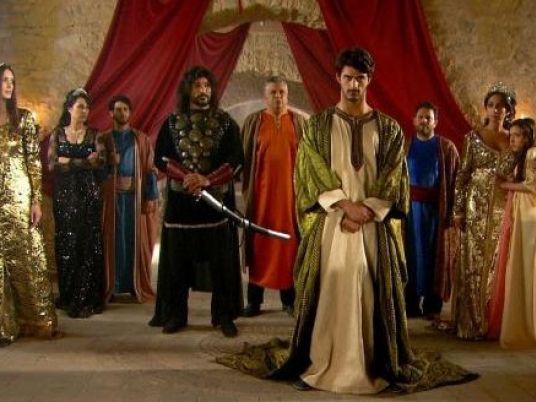Celebrated oriental literary compilation “One thousand and One Nights” (Alf Leila wa Leila) has ignited controversy once more this week. Although it has survived through the ages, it’s now under threat of a ban in Egypt…again.
“One Thousand and One Nights” is a cornerstone of Arab literary heritage, the influence of which has spread across the world. It was compiled by numerous scholars over many centuries, dating back to the 10th century, and its legendary tales are rooted in the folklore, oral traditions and literature of classical Islamic civilization, stretching across the Arab world and into South Asia.
Now, a group of lawyers, dubbed “Lawyers without Restrictions,” have filled a complaint to the Attorney General’s office, calling for the confiscation of the book and for the imprisonment of its publishers from the General Authority of Culture. They cite Article 178 of the Penal Code, which criminalizes the publication of material found to be “offensive to public decency”–a charge that can carry a two-year jail sentence and monetary penalties.
It would not be the first time for this ancient work to be outlawed: it was last banned in Egypt in the late 1980s.
There isn’t a single fixed version of “One Thousand and One Nights,” and this latest edition from the General Authority of Culture is being published as part of its “Treasures” series. Lawyers mounting the case oppose the language used in the new edition, and the Arab Network for Human Rights Information (ANHRI) reports that the two parts already published have been seized by the lawyers as evidence.
Human rights groups have documented an increase in these kinds of Hesba lawsuits in recent years. Hesba is based on the principle that each individual is responsible for upholding the values of society–thus citizens can take to court those deemed to be insulting Islamic values. The idea of collective responsibility for one’s society is a noble one, but it has also been subject to abuse.
Egypt and Libya Researcher at Human Rights Watch Heba Morayef describes it as “a problematic trend for violations of freedom of expression” as cases of this nature proliferate. ANHRI has been following the rise in political and religious Hesba cases and warns that it stifles open debate, describing the phenomenon last year as an “enormous threat to the freedom of expression in Egypt, which is becoming so monstrous, willing to engulf every new opinion and different thought.”
Graphic novel author Magdy Shafee and publisher Mohamed El-Sharqawy are among the most recent public figures to face Hesba cases, and other prominent persons to be targeted have included outspoken writer Nawal El-Saadawi, businessman Naguib Sawiris and secular intellectual Sayed el-Qimni, who was awarded the State Award for Merit in Social Sciences in 2009.
However, one of the earliest and most high-profile Hesba cases was that filed against Quranic scholar and liberal Islamic thinker Nasr Hamed Abu Zeid, formerly of Cairo University. He leaped into the spotlight in 1995 when a Cairo appeals court divorced him from his wife on the grounds that his writings made him an apostate, and so his marriage to a Muslim woman was annulled.
One would think that a government body such as the General Authority for Culture would be safe from this kind of legal action–but this is not necessarily the case. This time last year, the Ministry of Culture’s magazine Ibdaa was suspended for a period of time following a lawsuit that challenged a poem it published deemed by some to be blasphemous. ANHRI director Gamal Eid blasted Culture Minister Farouk Hosni’s reaction to the incident, saying: “He didn’t lift a finger.”
According to ANHRI, government passivity in the face of the growing preponderance of Hesba cases is throwing fuel on the fire, emboldening those who seek to stifle free debate for reasons of personal promotion or religious fanaticism. But the government may also stand to benefit, ANHRI argues, noting that “the looseness of government in facing these Hesba cases, which are a real threat to freedom of expression and creativity in Egypt, has only one explanation: giving the government a free hand to pursue challenging writers and journalists.”
As for the most recent case, members of the literary establishment are not wholly surprised. Samia Mehrez, Professor of Arab and Islamic Civilizations at the American University in Cairo and specialist in Arabic Literature, says quite simply that, “This is an old game.” She suggests it is the result of the current dynamic of struggle between the regime and religious conservative elements, which she describes as “a very tight political game between Islamists and the state, in which culture becomes a pawn.”
The case hinges on the alleged “obscene” content of these ancient tales. But the fluidity of language and cultural mores over time can make this difficult to pin down. As one blogger writing for the Arab News Blog points out, “There’s the fact that language changes, and yesterday’s taboos become today’s shibboleths, and vice versa. A generation or so ago in America, strong old Anglo-Saxonisms relating to sex and excrement were absolutely taboo except in works by Joyce or D.H. Lawrence, but ethnic slurs were common.”
Professor Mona Mikhail, also of the Arab and Islamic Civilizations Department at the American University in Cairo, sums it up succinctly: “As for ‘obscene’ materials, this remains in the eye of the beholder.”

